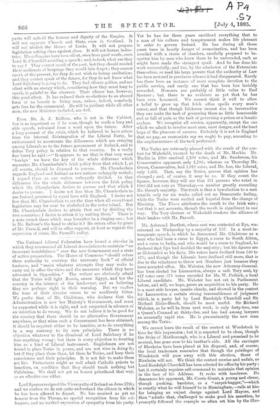Even Mr. A. J. Balfour, who is not in the
Cabinet, but is as important as if he were, though he made a long and able speech, refrained from a word upon the future. After a long account of the crisis, which he believed to have arisen from the internal disintegration of the Liberal Party, he endeavoured to accentuate the differences which are creeping among Liberals as to the future government of Ireland, and to define Tory policy in relation to that country. In a really fine burst he said :—" It appears to me that in that very word foreign ' we have the key of the whole difference which separates Mr. Chamberlain's Irish policy from that which I, at all events, should be disposed to pursue. Mr. Chamberlain regards England and Ireland as two nations unhappily united ; I regard them as one nation unhappily divided. In that difference lies the whole difference bet wen the Irish policy which Mr. Chamberlain desires to pursue and that which I desire to pursue. I desire not less than Mr. Chamberlain to see Ireland governed by equal laws with England. I desire not less than Mr. Chamberlain to see the time when all exceptional legislation may for ever be abolished in the sister island. But Mr. Chamberlain desires to attain that end by dividing the two countries ; I desire to attain it by uniting them." There is a note struck there which may hereafter be a ringing one ; but is Mr. Balfour's the hand to strike it ? He enters office by grace of Mr. Parnell, and will in office support, at least as regards the repression of crime, Mr. Parnell's policy.


































 Previous page
Previous page